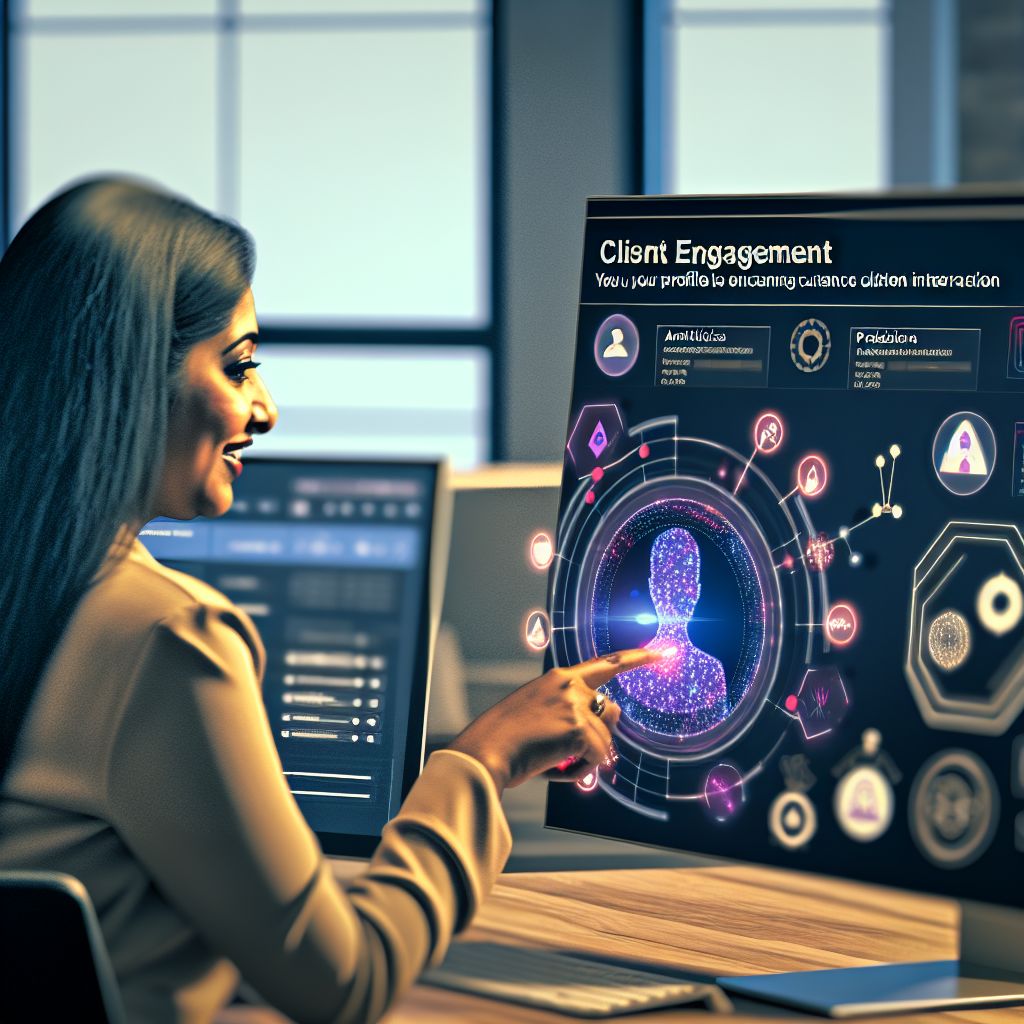Introduction
Let’s explore automate influencer campaigns with AI-Driven analytics tools
Brief overview of influencer marketing and its significance in modern advertising
Influencer marketing has transformed the advertising landscape.
Brands increasingly rely on influencers to reach targeted audiences.
This method enhances brand visibility and boosts consumer engagement.
As social media platforms evolve, so do the strategies behind influencer campaigns.
Introduction to AI-driven analytics tools
AI-driven analytics tools have emerged as game changers in this field.
These tools offer insights into consumer behavior and content performance.
They help brands identify the right influencers for their target market.
Moreover, they streamline campaign management and measurement.
Purpose of the post and what readers can expect to learn
The purpose of this post is to explore how you can automate influencer campaigns.
Readers will discover effective AI-driven analytics tools.
This knowledge will enable brands to enhance their marketing efforts significantly.
First, we will delve into the basic principles of influencer marketing.
Understanding these principles is essential for leveraging AI tools effectively.
Next, we will examine various AI-driven analytics tools available.
Each tool offers unique capabilities tailored to specific needs.
Lastly, we will discuss best practices for implementing these tools.
By the end of this post, readers will understand the synergy between influencer marketing and AI.
You will learn to harness data-driven insights for your campaigns.
These insights can drive your marketing decisions and help you measure success.
In a world where data guides decisions, utilizing AI tools becomes imperative.
As brands adapt to new technologies, they gain a competitive edge.
With AI-driven analytics, marketers can track engagement metrics in real-time.
They can also evaluate the effectiveness of each influencer.
Therefore, AI tools not only optimize influencer campaigns but also enhance decision-making.
They provide clarity in a complex landscape, ensuring brands connect with the right audiences.
As we explore further, let’s dive deep into actionable strategies for automating influencer campaigns.
The Evolution of Influencer Marketing
Marketing has undergone a dramatic transformation over the past few decades.
Traditional advertising once dominated the landscape.
Advertisers primarily relied on television, radio, and print media to reach their audiences.
However, this shift paved the way for more personalized, relatable forms of advertising: influencer partnerships.
Historical Context: From Traditional Advertising to Influencer Partnerships
In the early days, brands relied heavily on celebrity endorsements.
Companies often paid top dollar for well-known figures to promote their products.
This approach brought mixed results, as the connection between the celebrity and the product was sometimes tenuous.
As the internet expanded, so did advertising avenues.
We Design & Develop Websites, Android & iOS Apps
Looking to transform your digital presence? We specialize in creating stunning websites and powerful mobile apps for Android and iOS. Let us bring your vision to life with innovative, tailored solutions!
Get Started TodayThe rise of blogs and early social media platforms introduced a new wave of marketing potential.
Influencers began to emerge, often starting as regular users posting about their interests.
These individuals had unique insights into niche markets and attracted dedicated followers.
Today’s influencer marketing is significantly different from its predecessors.
Brands now partner with influencers who align with their values.
This evolution reflects a shift toward authenticity.
Audiences prefer relatable voices over polished celebrity endorsements.
Rise of Social Media and Its Impact on Influencer Marketing
Social media platforms have revolutionized how influencers connect with their audiences.
Initially, platforms like Facebook and Twitter dominated.
However, the emergence of visual networks, such as Instagram and TikTok, has reshaped influencer marketing.
Consider the following points regarding social media’s impact:
- Direct Engagement: Influencers engage with their followers in real-time.
- Content Diversity: Platforms facilitate various content types, from videos to stories.
- Global Reach: Brands can connect with international audiences, breaking geographic barriers.
- Micro-Influencers: Niche influencers hold sway, often leading to higher engagement rates.
Social media enables brands to target specific demographics effectively.
Ad targeting based on interests and behaviors leads to higher conversion rates.
Influencers naturally integrate products into their content, creating a more organic marketing experience.
Current Trends and Statistics Showcasing the Effectiveness of Influencer Campaigns
The effectiveness of influencer marketing has been supported by numerous statistics.
Recent studies reveal profound trends that companies should embrace:
- High ROI: Brands earn an average of $5.78 for every $1 spent on influencer marketing.
- Audience Trust: 61% of consumers trust influencer recommendations over brand advertisements.
- Growing Spend: Companies are expected to allocate over $15 billion to influencer marketing by 2022.
- Content Creation: Influencers produce 5x more engagement on posts compared to traditional advertising.
Brands must adapt to these evolving trends and explore creative influencer collaborations.
These partnerships result in authentic connections with consumers.
The evolution from traditional advertising strategies to influencer partnerships reflects a broader societal shift towards authenticity, relatability, and engagement.
To capitalize on this evolving landscape, brands need to implement AI-driven analytics tools.
These tools streamline influencer marketing campaigns, ensuring businesses engage with the right influencers to amplify their messaging effectively.
Read: Optimize Cybersecurity with Real-Time DMARC Monitoring Insights
Understanding AI-Driven Analytics Tools
In the rapidly evolving landscape of marketing, AI-driven analytics tools have emerged as crucial assets for brands seeking to amplify their influencer campaigns.
These tools utilize artificial intelligence to analyze vast amounts of data, delivering insights that help marketers make informed decisions.
Understanding these tools will empower brands to execute effective influencer strategies.
Definition and Purpose of AI-Driven Analytics in Marketing
AI-driven analytics in marketing refers to the application of sophisticated algorithms and machine learning techniques to process data.
The primary purpose of these tools is to extract actionable insights from complex datasets.
Brands need to grasp consumer behavior, track campaign performance, and ultimately increase their return on investment (ROI).
By leveraging AI-driven analytics, marketers can:
- Identify Trends: Capture emerging trends in real-time.
- Enhance Targeting: Improve audience targeting by analyzing behaviors.
- Optimize Campaigns: Refine marketing strategies based on performance data.
- Increase Engagement: Foster stronger interactions with potential customers.
Types of AI Tools Commonly Used in Influencer Marketing
Various AI tools exist that facilitate tasks related to influencer marketing.
Here are some commonly utilized types:
Social Listening Tools
Social listening tools allow brands to monitor online conversations and trends.
These tools gather data from various social media platforms.
By analyzing user-generated content and reactions, marketers can uncover valuable insights.
Through social listening, brands can:
We Design & Develop Websites, Android & iOS Apps
Looking to transform your digital presence? We specialize in creating stunning websites and powerful mobile apps for Android and iOS. Let us bring your vision to life with innovative, tailored solutions!
Get Started Today- Gauge Brand Sentiment: Understand how audiences perceive their brand.
- Identify Key Influencers: Locate influencers who are discussing relevant topics.
- Track Competitors: Monitor competitors’ mentions and strategies.
- Analyze Trends: Spot emerging trends that can inform future campaigns.
Engagement Analytics
Engagement analytics tools measure audience interaction with influencer content.
They analyze metrics such as likes, shares, comments, and click-through rates.
This data provides insights into audience preferences and content performance.
Marketers can utilize engagement analytics to:
- Calculate Engagement Rates: Assess how well content resonates with audiences.
- Determine Content Effectiveness: Identify which content formats drive engagement.
- Monitor Influencer Performance: Evaluate the effectiveness of various influencers.
- Refine Content Strategy: Adjust content strategies based on what works.
Predictive Analytics
Predictive analytics focuses on using historical data to forecast future outcomes.
These tools employ algorithms to identify patterns and predict trends.
Brands can utilize these insights to make proactive decisions.
With predictive analytics, marketers can:
- Forecast Campaign Success: Estimate the potential success of various campaigns.
- Improve Budget Allocation: Allocate resources effectively based on predictions.
- Enhance Influencer Selection: Choose the right influencers with the highest potential impact.
- Identify New Opportunities: Spot potential market opportunities for expansion.
Benefits of AI-Driven Analytics Tools
Employing AI-driven analytics tools offers several distinct advantages for influencer marketing campaigns.
Understanding these benefits will reinforce the importance of integration in marketing strategies.
Data-Driven Decisions
AI-driven analytics tools empower marketers to make data-driven decisions.
Brands can base their marketing strategies on actual consumer behavior rather than mere assumptions.
This approach significantly enhances the effectiveness of campaigns.
Increased Efficiency
Automation plays a crucial role in improving efficiency.
AI-driven tools automate manual tasks, such as data collection.
Marketers can focus their time and resources on strategy and creative processes when tools handle the routine work.
Improved Targeting
AI-driven analytics provide deeper insights into target audiences.
Brands can segment their audiences with exceptional precision.
This targeted approach ensures that marketing messages reach the right people at the right time.
Real-Time Insights
One key advantage of AI analytics is the ability to gather real-time insights.
Marketers can adjust campaigns on-the-fly based on current data.
This agility allows brands to stay ahead of trends and audience preferences.
Choosing the Right AI-Driven Analytics Tools
With various AI-driven analytics tools available, selecting the right one is essential for campaign success.
Marketers should consider the following factors:
- Business Goals: Align tool selection with specific marketing objectives.
- Integration Capabilities: Ensure the tool integrates smoothly with existing systems.
- User-Friendliness: Choose tools that are intuitive and easy to use.
- Scalability: Select tools that can grow with your business needs.
By understanding and leveraging AI-driven analytics tools, marketers can effectively automate their influencer campaigns.
These tools not only provide insights but also enhance overall campaign performance.
Embracing AI in influencer marketing is no longer optional; it’s essential for brands striving for success in today’s competitive landscape.
Brands that harness these technologies will stay ahead of the curve and maximize their ROI.
Read: Streamlining Site Compliance: Advanced Policy Generation Tech
Benefits of Automating Influencer Campaigns
Influencer marketing has become a significant strategy for brands looking to thrive in competitive markets.
However, managing influencer campaigns can be daunting.
Automating these campaigns leads to numerous benefits for businesses.
Time Efficiency and Resource Optimization
One of the core advantages of automating influencer campaigns is time efficiency.
Handling influencer relationships manually can become time-consuming.
Automation simplifies processes and saves valuable hours for marketers.
We Design & Develop Websites, Android & iOS Apps
Looking to transform your digital presence? We specialize in creating stunning websites and powerful mobile apps for Android and iOS. Let us bring your vision to life with innovative, tailored solutions!
Get Started TodayHere’s how time efficiency manifests:
- Streamlined Communication: Automation tools manage outreach efforts, ensuring timely responses with influencers.
- Scheduled Posts: Brands can schedule content releases in advance, maintaining consistency.
- Automated Reports: Tools generate performance reports automatically, reducing manual data collection.
- Improved Workflow: Automation centralizes campaign management, reducing confusion and enhancing productivity.
With these benefits, marketers can redirect their focus towards creativity and strategy.
This shift leads to innovative campaigns rather than routine administration.
Thus, brands can deliver memorable experiences without compromising quality or engagement.
Improved Targeting and Audience Segmentation
Automation technologies provide enhanced targeting and audience segmentation opportunities.
Understanding the audience is vital for effective marketing. Influencer campaigns thrive on precisely targeting the right demographics.
Here’s how automation facilitates improved targeting:
- Advanced Analytics: AI-driven tools analyze audience data to identify potential influencers.
- Behavioral Insights: Automation captures and processes user behavior information, tailoring campaigns to specific interests.
- Segmentation Capabilities: Marketers can segment audiences based on preferences, increasing relevance.
- Customizable Targeting: Tools allow for adjustments based on real-time data, ensuring campaigns stay relevant.
This level of insight leads to campaigns that resonate strongly.
Marketers can avoid wasted resources by reaching only those who matter.
The result sees higher engagement rates and better interaction with brand messages.
Data-Driven Decision Making for Better ROI
In today’s data-centric world, making informed decisions is crucial.
Automation contributes significantly to data-driven strategies in influencer marketing.
Here’s how it enhances decision-making:
- Real-Time Analytics: Brands can access data instantly, allowing for quick strategy adjustments.
- Performance Metrics: Automation tracks campaign success indicators like impressions, clicks, and conversions.
- Attribute Results: Tools help attribute sales or leads directly to specific influencers, determining effectiveness.
- Historical Data Analysis: Brands leverage past campaign performance data to forecast future results.
Companies can significantly enhance their return on investment (ROI) through informed decisions.
A focus on data dictates which strategies yield positive results.
Consequently, unnecessary expenditures decrease while revenue maximizes.
Enhanced Collaboration
Influencer campaigns often require collaboration between various stakeholders.
Automation fosters collaborative environments by integrating communication tools.
This connection streamlines planning and execution. Here are benefits of enhanced collaboration:
- Centralized Platforms: Teams can access everything from a single dashboard, simplifying workflow.
- Project Management Tools: Automating reminders and deadlines helps keep teams organized and accountable.
- Shared Data Access: Everyone involved can view performance metrics, aligning goals and strategies.
- Feedback Mechanisms: Automation enables quick feedback from stakeholders, facilitating faster improvements.
This collaborative approach leads to more cohesive campaigns.
Creative ideas flourish when everyone is engaged in the process.
Teams feel empowered to share insights and improve overall campaign success.
Scalability of Campaigns
As brands grow, so do their marketing needs.
Automating influencer campaigns enables easy scaling.
Businesses can expand their influencer network without sacrificing quality.
The key benefits of scalability include:
- Rapid Deployment: Brands can launch multiple campaigns simultaneously without increased effort.
- Wider Reach: Automation allows for managing a larger pool of influencers effortlessly.
- Resource Allocation: Teams can deploy resources strategically based on campaign performance data.
- Flexible Strategies: Automated tools adapt to new trends quickly, ensuring relevance amid change.
Successful campaigns often require flexibility and availability.
Automation provides that adaptability, making it easier for brands to respond to market shifts.
Consequently, they can seize opportunities more effectively.
Cost Effectiveness
Automating influencer campaigns can yield significant cost savings over time.
While setting up automation tools may require investment, the long-term benefits outweigh the initial costs.
Here’s how cost-effectiveness comes into play:
- Reduction of Manpower: Automation reduces the need for extensive teams in campaign management.
- Minimized Errors: Automating processes reduces human error, resulting in less wasted budget.
- Optimization Algorithms: AI tools ensure budget allocation occurs where it has the most significant impact.
- Lower Churn Rates: Improved targeting and audience retention lead to a better lifetime value of customers.
Brands can achieve better financial outcomes while still delivering impactful campaigns.
This approach supports sustainable growth amid evolving market conditions.
As a result, investor confidence improves thanks to solid returns and efficient operations.
We Design & Develop Websites, Android & iOS Apps
Looking to transform your digital presence? We specialize in creating stunning websites and powerful mobile apps for Android and iOS. Let us bring your vision to life with innovative, tailored solutions!
Get Started TodayIn essence, automating influencer campaigns presents numerous compelling benefits.
Time efficiency and resource optimization ease the burden of campaign management.
Improved targeting and audience segmentation lead to deeper engagement.
Furthermore, data-driven decision-making greatly enhances ROI.
Collaboration becomes more streamlined, scalability increases, and cost-effectiveness is evident.
Thus, brands can confidently embrace automation tools, ensuring they thrive in the competitive landscape of influencer marketing.
Read: AI-Driven Content Management: Revolutionizing Knowledge Organization

Key Metrics to Track with AI Analytics
When automating influencer campaigns, understanding key metrics is crucial.
AI-driven analytics tools provide deep insights.
These insights empower brands to optimize their campaigns effectively.
Below are essential metrics you should track to gauge success.
Engagement Rates: Likes, Comments, Shares
Engagement rates serve as a primary indicator of content performance.
These rates reflect how well an audience interacts with the influencer’s content.
- Likes: Monitor the total number of likes a post receives. High likes indicate positive audience reception.
- Comments: Analyze comments to gauge audience sentiment. More comments can signal heightened interest or concerns.
- Shares: Track how often content is shared by followers. This metric shows the organic reach of the campaign.
By using AI analytics tools, brands can quickly compile this data.
They can segment engagement by demographics or psychographics.
This breakdown allows brands to tailor content to specific audiences.
For instance, a younger audience might prefer visual content over long-form text.
Reach and Impressions: Measuring Audience Size
Understanding reach and impressions is vital for gauging campaign visibility.
Reach refers to the total number of unique users who see the content.
- Reach: It measures how widespread the campaign is. High reach indicates a broader audience exposure.
- Impressions: This metric counts how many times the content appears on users’ screens. It includes multiple views from the same user.
Tracking these metrics highlights the effectiveness of influencer strategy.
For instance, a post with high impressions but low engagement may need adjustment.
Brands can analyze factors contributing to this discrepancy.
AI analytics can provide insights into timing, format, or platform effectiveness.
Conversion Rates: From Clicks to Sales or Sign-Ups
Conversion rates are essential for determining the return on investment (ROI) of campaigns.
This metric tracks how many people take action after engaging with content.
- Clicks: Measure the number of users who click on your call-to-action (CTA). Clicks are the first step toward conversion.
- Sales: Track the actual sales generated from the campaign. This metric directly reflects the campaign’s effectiveness.
- Sign-Ups: Measure how many users complete a sign-up process. High sign-up rates indicate successful persuasion.
AI-driven tools can optimize the conversion funnel.
They analyze user behavior to identify drop-off points.
For instance, if users click but do not sign up, the CTA or landing page may need enhancement.
Understanding the user journey helps brands refine their approach and improve results.
Sentiment Analysis: Understanding Audience Perception
Sentiment analysis provides valuable insights into audience perceptions.
This metric uses natural language processing to evaluate comments and messages.
- Positive Sentiment: A high proportion of positive comments indicates favorable brand perception.
- Negative Sentiment: Tracking negative comments is essential for crisis management. Quick responses can mitigate potential damage.
- Neutral Sentiment: Neutral comments can provide insights into audience ambivalence. Brands can explore why users remain indifferent.
AI tools can process vast amounts of data quickly.
They offer real-time feedback, enabling brands to make instant adjustments.
For example, if sentiment turns negative, brands can address concerns rapidly.
This proactive approach helps maintain audience trust and loyalty.
We Design & Develop Websites, Android & iOS Apps
Looking to transform your digital presence? We specialize in creating stunning websites and powerful mobile apps for Android and iOS. Let us bring your vision to life with innovative, tailored solutions!
Get Started TodayIntegrating Metrics for Comprehensive Insights
Tracking these individual metrics is essential, but integration provides a fuller picture.
Analyzing the correlations among these metrics reveals deeper insights.
- Engagement and Conversion: High engagement does not automatically lead to conversions. Brands must explore the relationship between these metrics.
- Reach and Sentiment: Understanding how reach influences sentiment helps optimize targeted campaigns. Positive sentiment among a broader audience can enhance brand authority.
- Sentiment and Conversion: Positive sentiment can boost conversion rates. Brands should foster and promote favorable perceptions in their campaigns.
Effective use of AI-driven analytics enables brands to derive comprehensive insights.
This focus on interconnected metrics can drive campaign success.
Brands can refine strategies by testing different content types and monitoring results.
In influencer marketing, tracking key metrics is crucial for success.
AI-driven analytics tools simplify data collection, analysis, and interpretation.
By focusing on engagement rates, reach, conversion rates, and sentiment analysis, brands can create effective campaigns.
Integrating these metrics enhances decision-making and optimizes overall strategy.
The continuous refinement of influencer campaigns ensures brands can keep up with audience preferences and market trends.
Read: Read: RPA Strategies for Modern Workflows: Mastering Automation Transformation
Case Studies of Successful AI-Driven Influencer Campaigns
In today’s marketing landscape, brands leverage advanced technology to optimize their influencer campaigns.
Several companies have turned to AI-driven analytics tools to enhance their strategies.
These tools provide valuable insights into audience engagement and influencer effectiveness.
Below, we examine notable case studies that demonstrate these successful implementations.
Adidas: Revolutionizing Sportswear Marketing
Adidas, a leading sportswear company, faced fierce competition in a saturated market.
To stand out, they decided to incorporate AI analytics into their influencer campaigns.
They aimed to identify the most effective influencers for their target audience.
- Strategy Employed: Adidas utilized AI tools to analyze influencer audience demographics, engagement rates, and content performance.
- Data-Driven Selection: By choosing influencers with authentic engagement rather than just follower count, they improved their outreach.
- Real-Time Monitoring: The brand used AI for continuous tracking of campaign performance.
The results were outstanding:
- They achieved a 30% increase in engagement rates during the campaign.
- Sales grew by 25%, significantly surpassing their projections.
- Brand loyalty increased, as many new customers became repeat buyers.
One key lesson learned was the importance of selecting the right influencers.
Authenticity proved to correlate directly with engagement and sales.
Fenty Beauty: Crafting Beauty Campaigns with AI Insights
Fenty Beauty, a beauty product company, wanted to enhance its seasonal campaign.
They leveraged AI-driven analytics to fine-tune their influencer partnerships and achieve better outcomes.
- Audience Segmentation: Fenty Beauty used AI to assess different customer segments globally.
- Influencer Matching: They matched influencers with their corresponding niches effectively using AI recommendations.
- Content Optimization: AI-assisted in suggesting post timings and formats for maximum engagement.
The campaign’s success was measurable:
- The brand experienced a 40% increase in social media mentions.
- Customer inquiries on their website rose by 60% during the campaign period.
- The return on investment (ROI) improved dramatically, reaching 300%.
Key takeaways included the importance of real-time data analysis and careful influencer selection.
These practices helped streamline their campaigns and target their audience more effectively.
Starbucks: Energizing Food and Beverage Promotions
Starbucks, known for its organic beverages, needed a fresh approach to influencer marketing.
They invested in AI-driven analytics tools to identify the right influencers who resonated with their sustainability message.
- Data-Driven Decisions: The brand analyzed sentiment data regarding their products across social media platforms.
- Targeted Approach: They focused on influencers who championed sustainability and healthy living.
- Engagement Tracking: AI tools allowed for ongoing adjustments and optimization during the campaign.
The impact was significant:
- They noted a 50% increase in positive sentiment on social media about their product line.
- Sales soared by 35%, reaching new customer demographics.
- Their marketing expenses became more efficient, yielding a 150% ROI.
This case highlighted the value of aligning brand values with influencer messaging.
Authentic storytelling drove excitement and interest around the product.
Epic Games (Fortnite): Tech Innovations in Gaming Marketing
Epic Games (Fortnite), a new gaming company, sought to captivate a younger audience.
They turned to AI-driven analytics to revamp their influencer marketing strategies.
- Platform Selection: They analyzed user preferences to determine the best platforms for engagement.
- Influencer Collaboration: The company partnered with both micro and macro-influencers, creating diverse outreach.
- Cohesive Campaign Messaging: AI helped maintain consistent messaging tailored to different audiences.
The campaign yielded impressive results:
- Engagement rates reached an all-time high, increasing by 65%.
- New user registrations rose by 70% during the campaign’s peak.
- The brand achieved notable mentions in major gaming publications.
Lessons learned emphasized the importance of cross-platform strategies and varied influencer partnerships.
We Design & Develop Websites, Android & iOS Apps
Looking to transform your digital presence? We specialize in creating stunning websites and powerful mobile apps for Android and iOS. Let us bring your vision to life with innovative, tailored solutions!
Get Started TodayThe campaign’s adaptability contributed to its success.
Embracing AI-Driven Campaign Analytics
These case studies illustrate the transformative power of AI in influencer marketing.
By examining real-world examples, brands can extract valuable insights to enhance their campaigns.
Key strategies employed include:
- Utilizing data-driven influencer selection processes.
- Emphasizing ongoing performance monitoring and adjustments.
- Aligning brand values with influencer messages for authenticity.
- Segmenting target audiences effectively to maximize engagement.
Moving forward, brands must embrace AI-driven analytics for a competitive edge.
By tapping into the potential of these tools, they can create more impactful and successful influencer campaigns.
Challenges and Considerations in Using AI for Influencer Marketing
As businesses integrate AI-driven analytics tools into their influencer marketing strategies, they encounter various challenges and considerations.
While AI offers powerful capabilities, it also presents potential pitfalls and demands careful oversight.
Potential Pitfalls and Limitations of AI-Driven Analytics
Organizations embracing AI in influencer marketing should be aware of its limitations.
Understanding these challenges helps mitigate risks and optimize campaigns.
Here are some common pitfalls:
- Bias in Data: AI tools depend heavily on the data they analyze. If the input data contains biases, the insights generated will also be biased. This can skew influencer selection and campaign targeting.
- Over-reliance on Automation: Businesses may become overly dependent on AI insights. While automation streamlines processes, it can lead to oversight of nuanced elements that only human intervention can catch.
- Inaccurate Predictions: Algorithms may fail to predict trends accurately, especially in rapidly changing markets. Static models can mislead marketers about audience preferences.
- Limited Interpretation Capabilities: AI can identify patterns but cannot grasp the underlying context behind numbers. This lack of understanding may lead to misinterpretation and faulty decision-making.
Importance of Human Oversight in Interpreting AI-Generated Data
Despite the sophistication of AI tools, human insight remains essential.
Combining technology with human expertise can yield better outcomes.
Here’s why human oversight is critical:
- Contextual Understanding: Humans can interpret data within broader social, cultural, and economic contexts. This context adds depth to data analysis that AI alone cannot achieve.
- Emotional Intelligence: Humans understand emotional responses. They can evaluate influencer authenticity and audience engagement beyond mere numbers.
- Creative Decision-Making: Marketing demands creativity and innovation. Humans can devise unique strategies that resonate emotionally with audiences, filling gaps AI cannot address.
- Ethical Oversight: Human intervention ensures the ethical use of AI. It includes evaluating the ethical implications of data usage and influencer partnerships.
Ethical Considerations Regarding Data Privacy and Influencer Authenticity
The integration of AI in influencer marketing raises ethical questions that organizations must address.
The following concerns highlight critical areas for marketers to consider:
- Data Privacy: Companies gather vast amounts of user data to fuel AI algorithms. They must ensure compliance with data protection regulations, such as GDPR and CCPA, to safeguard privacy.
- Transparency: Brands should be transparent about data collection practices. Influencers and audiences deserve clarity regarding how their data is utilized and protected.
- Authenticity of Influencers: AI tools might identify influencers with high engagement metrics but not necessarily authenticity. Brands risk associating with influencers who lack genuine connections with their audiences.
- Manipulation of Results: Some influencers may manipulate metrics to appear more appealing to brands. Reliance solely on data without vetting influencers can lead to poor choices.
Navigating the Challenges and Considerations
To reap benefits while navigating the challenges posed by AI in influencer marketing, organizations should adopt a balanced approach.
Here are some strategies:
- Leverage Hybrid Models: Use a combination of AI analytics and human intuition. Let data inform decisions but prioritize human expertise in the final analysis.
- Invest in Training: Equip teams with the skills to interpret data intelligently. Knowledgeable marketers will extract more value from AI insights.
- Establish Transparency: Communicate openly with audiences about data practices. This builds trust and fosters healthier relationships with influencers and their followers.
- Regularly Audit AI Tools: Conduct routine assessments of AI tools to ensure they align with business goals. Validate their assumptions and performance metrics periodically.
AI-driven analytics tools undeniably transform influencer marketing strategies.
However, organizations must navigate the challenges they present.
Potential pitfalls, human oversight, and ethical concerns are not obstacles; they are integral components of successful campaigns.
By acknowledging these considerations, brands will enhance their approach and build authentic connections in a rapidly evolving landscape.
Ultimately, blending advanced technology with human insight leads to impactful influencer marketing strategies that resonate with audiences and achieve desired outcomes.
Future Trends in AI and Influencer Marketing
As the digital landscape transforms, the intersection of AI and influencer marketing becomes increasingly pivotal.
Businesses leverage AI technologies to refine their operations, while influencers enhance their engagement strategies.
This section explores future trends, predictions, and the evolving role of influencers in this dynamic landscape.
Predictions for How AI Will Further Innovate Influencer Marketing
The future of AI in influencer marketing promises significant innovations.
Several key predictions outline this trajectory:
- Enhanced Data Analysis: As AI tools improve, influencer marketing strategies will become more data-driven. Brands can utilize AI to analyze vast data sets, providing insights into audience behavior, preferences, and engagement metrics.
- Increased Personalization: AI algorithms will offer personalized content recommendations based on user interactions. Influencers can tailor their messages according to audience interests, resulting in higher engagement rates.
- Automated Campaign Management: Future AI tools will automate aspects of campaign management. Brands can schedule posts, manage collaborations, and track performance efficiently using AI systems.
- Improved Brand-Influencer Matching: AI will refine the process of matching brands with suitable influencers. Brands will rely on AI algorithms to assess audience alignment, engagement, and authenticity efficiently.
- Predictive Analytics for ROI: Brands will leverage AI to forecast campaign performance. Predictive analytics can inform investment decisions and resource allocation, ensuring more significant returns.
- AI-Generated Content: AI technology will enable the creation of data-driven content. Influencers could utilize AI tools to produce quality visuals and video narratives tailored to fit brand narratives.
New Technologies That May Emerge and Their Potential Impact
As AI technology evolves, we can anticipate various tools that will reshape influencer marketing.
Some noteworthy emerging technologies include:
- Machine Learning Platforms: These platforms will analyze influencer effectiveness and engagement. They will provide real-time feedback, enhancing campaign strategies dynamically.
- Virtual Influencers: AI-generated personas will further accelerate brand representation. Companies may collaborate with virtual influencers to reach niche audiences effectively.
- AR and VR Integration: Augmented reality (AR) and virtual reality (VR) will elevate influencer interactions. AI will facilitate immersive experiences that resonate with audiences on a new level.
- Blockchain for Transparency: Blockchain technology will ensure transparency in influencer marketing. It can streamline payments and verify the authenticity of influencer claims.
- AI Chatbots for Engagement: Chatbots powered by AI will enhance user engagement. Influencers can create conversational experiences that increase interaction with their followers.
- Smart Analytics Dashboards: Future analytics platforms will provide intuitive dashboards. These tools will enable brands to visualize data effectively, facilitating better decision-making processes.
The Evolving Role of Influencers in the Context of AI Advancements
As AI technologies advance, influencers must adapt their roles.
This evolution will manifest in various ways:
- Strategic Advisors: Beyond simple promotions, influencers will act as strategic advisors for brands. Their insights will enhance campaign development and execution.
- Content Curators: Influencers will curate meaningful content by analyzing data from AI tools. This curation will ensure relevancy and resonance with the target audience.
- Authenticity Advocates: In an era dominated by AI, influencers must maintain authenticity. They will prioritize genuine connections with their audiences, leveraging AI to support their narratives.
- Data-Driven Decision Makers: Influencers will utilize AI analytics to guide their content creation. They’ll harness data to understand trends and audience reactions more effectively.
- Collaboration Facilitators: Influencers will bridge gaps between brands and consumers. They’ll play a vital role in fostering collaborative efforts, creating impactful campaigns.
- Tech-Savvy Creators: As AI tools become commonplace, influencers must develop technical skills. Knowledge of AI-driven tech will enhance their content production quality.
Generally, the future of AI and influencer marketing holds great potential.
As AI continues to evolve, it will reshape how brands and influencers connect with their audiences.
The predicted advancements and emerging technologies will redefine strategies.
We Design & Develop Websites, Android & iOS Apps
Looking to transform your digital presence? We specialize in creating stunning websites and powerful mobile apps for Android and iOS. Let us bring your vision to life with innovative, tailored solutions!
Get Started TodayInfluencers will play a key role in leveraging these tools to enhance their engagement.
To remain competitive, brands must stay informed about these trends.
By embracing AI-driven analytics, they can optimize their influencer campaigns effectively.
The collaboration between AI and influencer marketing is a powerful combination, paving the way for innovative marketing strategies in the future.
Conclusion
Summarization of the key points discussed
In this discussion, we explored the transformative power of AI in influencer marketing.
We highlighted how AI-driven analytics tools streamline campaign management effectively.
By leveraging data-driven insights, brands optimize their influencer partnerships and maximize reach.
We examined how these tools assist in identifying the right influencers.
Brands can analyze engagement metrics to find suitable matches for their campaigns.
This precision leads to more authentic and effective collaborations.
We also addressed the importance of real-time analytics.
AI tools enable marketers to monitor campaign performance continuously.
This adaptability allows for immediate adjustments, ensuring that campaigns stay relevant and effective.
Moreover, we discussed predictive analytics and its role in forecasting campaign outcomes.
By evaluating past data, AI can predict which strategies will succeed.
This capability reduces risk and enhances decision-making for future endeavors.
Additionally, automating routine tasks frees up time for marketers.
Brands can focus on creative strategy rather than getting bogged down by data management.
This efficiency leads to more innovative campaigns and better resource allocation.
Final thoughts on the importance of integrating AI in influencer marketing
Final thoughts center on the importance of integrating AI into influencer marketing.
As the digital landscape evolves, so should brands’ marketing strategies.
AI is no longer an optional tool; it is essential for sustained growth.
Encouragement for brands to consider adopting AI tools for future campaigns
We encourage brands to consider adopting AI tools for future campaigns.
The potential benefits are immense, ranging from enhanced efficiency to better ROI.
Embracing these advancements positions brands at the forefront of digital marketing innovation.
AI-driven analytics tools offer unparalleled benefits for influencer campaigns.
They empower brands to make informed decisions while optimizing their marketing efforts.
Embracing this technology will undoubtedly lead to more successful influencer marketing strategies.
Before You Go…
Hey, thank you for reading this blog post to the end. I hope it was helpful. Let me tell you a little bit about Nicholas Idoko Technologies.
We help businesses and companies build an online presence by developing web, mobile, desktop, and blockchain applications.
We also help aspiring software developers and programmers learn the skills they need to have a successful career.
Take your first step to becoming a programming expert by joining our Learn To Code academy today!
Be sure to contact us if you need more information or have any questions! We are readily available.
Put Your Tech Company on the Map!
Get featured on Nicholas Idoko’s Blog for just $200. Showcase your business, boost credibility, and reach a growing audience eager for tech solutions.
Publish Now









